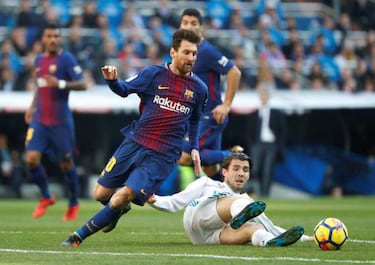El Clásico: The age-old problem of man-marking
In the Spanish edition of AS today, we've got an interesting take on El Clásico by Xabier Fortes, who writes about a wrong move by Marshal De Grouchy...
In the Spanish edition of today's AS, we've got an interesting take on Saturday's El Clásico by Xabier Fortes, who writes about the wrong move by Marshal De Grouchy that had a hand in Napoleon's defeat at Waterloo. A wrong move, says Forte, that was not unlike Mateo Kovacic's the other day, when, blinded by his primary task of sticking to Leo Messi, he let Ivan Rakitic run past him, with Messi a mere observer in the attack. Or was he? In yesterday's AS, Santiago Segurola wrote that, despite not touching the ball, he really played a key role in the goal. He was like the decoy who distracts the guards while thieves break in and make off with the loot. In this case, of course, the thieves were Rakitic, Sergi Roberto and Luis Suárez, who then shared the loot with Messi.
Dangers of man-marking exposed by Barcelona's opener in El Clásico
Related stories
Going right back to the early stages of the game at the Bernabéu, one of my fellow pundits on Spanish radio station Cadena SER, Álvaro Benito, had been warning that man-marking comes with this danger: when a player escapes the clutches of their marker, it creates a numerical advantage that in this instance was exacerbated by the fact that, in his determination to follow his orders on Messi to the letter, Kovacic let Rakitic go. The move was launched, of course, by a magnificent bit of play by Sergio Busquets, who attracted the attention of several Real Madrid players before delivering the ball to Rakitic. A collective attacking manoeuvre (with splendid accompaniment by Roberto and Suárez, who applied the finishing touch) against a rigid system of man-marking.

It's the age-old problem of employing the tactic: it can lead to an attitude of passing the buck, one of: if my man doesn't touch the ball, I've done my job. If there's a fire to be put out, it's not here; my house is in order. If the spaces are distributed effectively and the players show good positioning and are quick to help a team-mate under pressure, a more collective, zonal system tends to prove smarter and more sophisticated, and conducive to a more united defensive effort. De Grouchy, Fortes reminds us, was too wrapped up with dealing with the Prussian rearguard when Von Blücher linked up with Wellington and routed Napoleon, who was promptly carted off to Saint Helena. Football is war by other means, it's sometimes said. Let's hope that this particular combat doesn't see Zinedine Zidane end up on his own Saint Helena.
